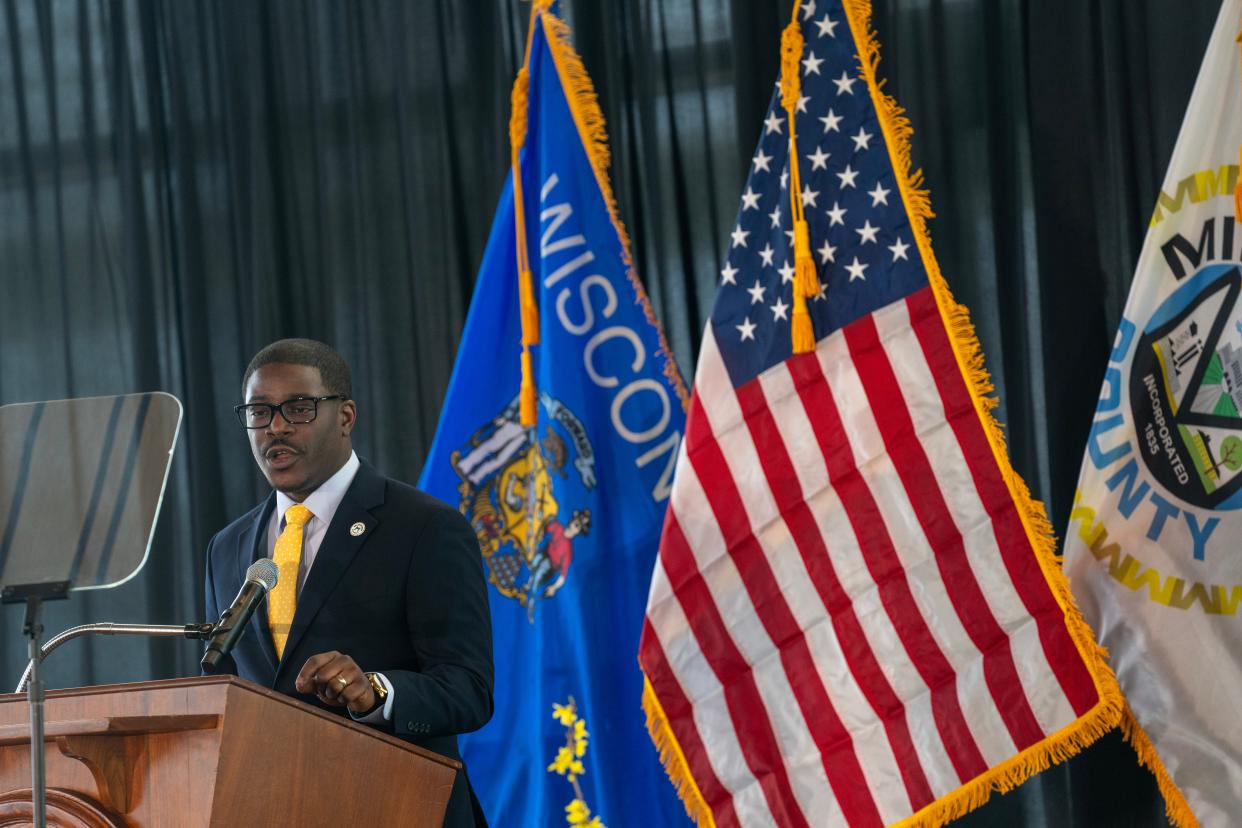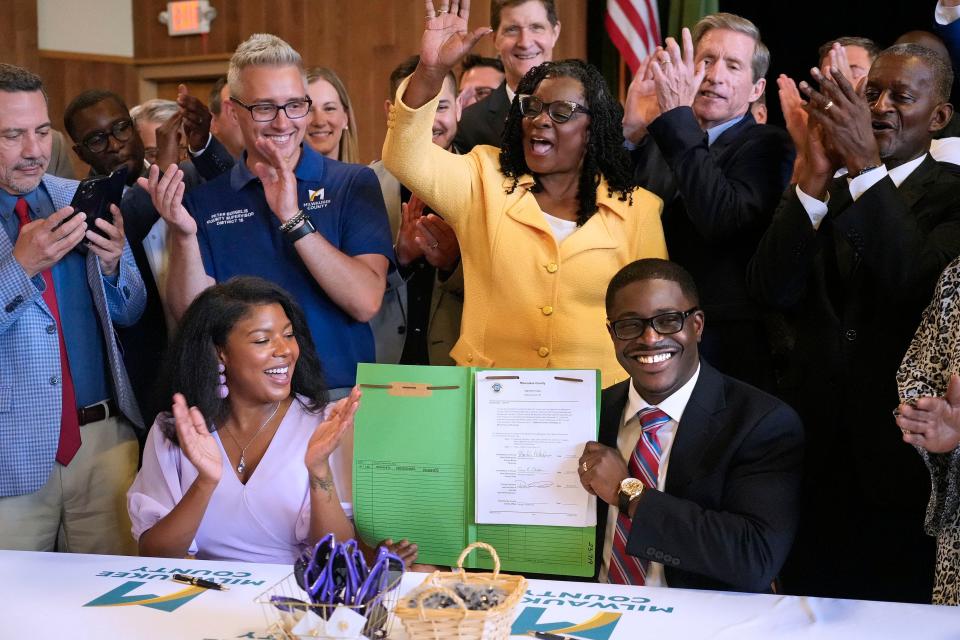Milwaukee County exec Crowley highlights year of big wins. Takeaways from his state of the county speech

For Milwaukee County Executive David Crowley, last year was a year of big wins and crucial partnerships.
During his annual State of the County address, Crowley highlighted a breadth of local projects that extended from local transit options and affordable housing investments to countywide mental health and substance use disorder-related services. The achievements have laid the groundwork for Crowley's campaign for re-election as county executive next month.
"The state of our county is getting stronger, healthier, and brighter every day," Crowley said during his speech at downtown's Discovery World on Tuesday. "I believe in our vision. I believe in our potential. And I believe in our future."
Despite outlining his many successes in the last year, Crowley echoed his sobering reminder that the county's job is not done.
"While our outlook has dramatically improved, Act 12 and the sales tax have not resolved all of our fiscal challenges, and we are mindful that there will be budget deficits again in future years," he said, referring to state legislative actions that increased the county's revenues. "Moving forward, we must strongly promote fiscal responsibility and thoughtful budgeting, while maintaining the level of service we need right here in Milwaukee County."
Historic win with local option sales tax increase

Last year saw lengthy negotiations to see a sales tax increase with state legislators that included lobbying from Crowley, Milwaukee Mayor Cavalier Johnson, Milwaukee County board Chairwoman Marcelia Nicholson and Milwaukee Common Council President José Pérez. These efforts by local officials were the long-desired capstone of a process to stave off major budget cuts countywide.
In August, Crowley signed off on the new county tax of 0.9%, an increase from its previous 0.5% tax. The increase went into into effect Jan. 1, with the expectation that sales tax revenue will generate roughly $84 million this year.
Crowley approved a $1.37 billion budget for 2024 late last year, which highlighted a reduction in the property tax levy by more than $21 million. The move was expected to translate into a $100 drop in the average property owner's property taxes in 2024.
Brewers remain in Milwaukee, generating millions in additional revenue
Last year's negotiations with state partners ended with a $500 million bipartisan agreement to renovate and improve American Family Field and keep the major league Milwaukee Brewers in the city through 2050.
The funding plan requires $67.5 million each from the city and Milwaukee County to pay for work on the stadium over almost 30 years, an amount that represented a reduction from earlier stages of negotiation.
"This means that Milwaukee County will have more local dollars to address local priorities, while keeping the Brewers in Wisconsin for many years without any additional impact on local taxpayers," Crowley said.
Infusion of local and federal dollars into transit and housing
At the start of 2023, the county faced looming fiscal cliffs, with some departments, including transit, already sinking into a financial mire. But with the sales tax bump and federal dollars allocation, the county was able to avoid an imminent crisis.
Following the budget process, Crowley allocated $17 million for the Milwaukee County Transit System to continue current service levels and increase transit security options. Following major concerns about the safety of riders and bus operators, the budget allocated a $1.3 million increase to enhance security.
MCTS launched its East-West Bus Rapid Transit (also known as CONNECT 1 Bus Rapid Transit) in June, which stretches along Wisconsin Avenue and Bluemound Road connecting Milwaukee's downtown area to the Milwaukee Regional Medical Center in Wauwatosa. The department also recently announced its recommended route for the new North-South Bus Rapid Transit route, which could run between Glendale's Bayshore Mall and the IKEA in Oak Creek along 27th Street. The expansion was approved in the county's 2024 budget cycle, with services set to begin as early as 2028.
Crowley's administration has also invested in street safety improvements across five municipalities in Milwaukee County, including portable speed bumps, temporary traffic circles, curb extensions and security cameras. Crowley also just announced the county's newly-launched motor vehicle collision dashboard.
Most recently, President Joe Biden signed new legislation into law that will infuse $1 million for public transit investments as well as another $7 million of federal dollars for affordable housing projects in the Milwaukee area.
In partnership with Habitat for Humanity and the Emem Group, the county is wrapping up the development of more than 100 new homes in the King Park neighborhood.
The county also deployed $15 million in federal pandemic funds for affordable housing developments, as well as $1 million in federal money for housing in Milwaukee's Uptown neighborhood.
"Housing is a matter of public health, and housing security is a crucial social determinant of health," Crowley said.
County's investment in substance use-related services saved lives
Milwaukee County had the highest rate of overdose deaths in the state, with more than 500 opioid overdose deaths reported in 2023.
In 2023, the county secured more than $100 million in opioid litigation settlement money.
Those funds have been used to finance 15 opioid projects with the county's Behavioral Health Services, including the installation of harm reduction vending machines — stocked with free supplies including fentanyl testing strips, Narcan and gun locks — across the county. More than 2,000 boxes of Narcan have been used from these machines, according to Crowley.
Crowley also mentioned two instances of when Narcan from these machines saved lives in the community, including when an MCTS bus driver administered Narcan to a transit rider who was experiencing an overdose.
"This is exactly why we are investing in harm reduction resources: because lives depend on it," Crowley said.
The county is now looking to expand these efforts as it looks for host businesses and organizations to install eight new machines this year.
The county also took steps to rebuild health and human services Marcia P. Coggs Health and Human Services Center in the King Park neighborhood. The center is scheduled to open in 2025.
The neighborhood is also now home to the recently opened Mental Health Emergency Center, which has served more than 7,000 individuals experiencing a mental health or substance use disorder-related crisis.
And more recently, the county opened three behavioral health access clinics, including one on the city's northwest side, to continue to expand services for those facing crises.
Contact Vanessa Swales at 414-308-5881 or vswales@gannett.com. Follow her on X @Vanessa_Swales.
This article originally appeared on Milwaukee Journal Sentinel: Takeaways from Milwaukee County Exec Crowley's State of the County

